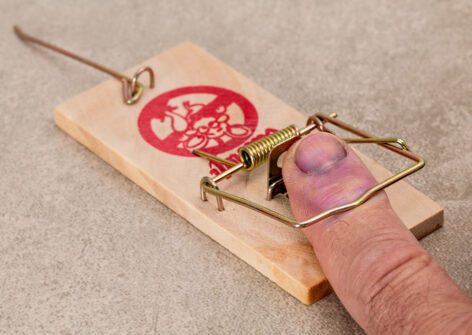As a blogger, trying to achieve first page of results in Google is the ultimate dream. According to statistics from 2017, 75% of searchers never go any further than the first page results with 30% of visitors clicking on the first link. In short, if you’re not on the first page of results, you’re missing out on huge amounts of traffic.
In 2019 and beyond, the statistics are even more significant. According to Ahrefs, 99% of people don’t go beyond first page results.
For this reason, SEO should be a vital part of your blogging strategy. Optimizing your website and blog posts for SEO can help to boost your rankings in Google, getting you closer to the ‘holy grail’ first page results. However, there are some common blogging SEO mistakes that could be doing more harm than good. Are you making these overlooked blogging mistakes?
Mistake #1: Your articles are too short
Naturally, Google advocates longer pieces of content – as detailed content helps users with the query they are searching for. Backlinko found that pages ranking on page 1 had an average of nearly 1900 words! Effectively, any blog post under 500 words is going to be less effective and attractive to search engines than long-form content.
It seems clear that Google wants to present searchers with detailed, in-depth information that offers value to online visitors.

Mistake #2: You post too often
In the past, Google was heavily focused on websites that were regularly updated. It led to some bloggers posting multiple times per day in order to try to remain relevant. This resulted to a culture of article-churn where thousands of poor-quality blogs were posted daily.
Now, Google seems to have reversed the impact of this somewhat (either intentionally, or just as part of algorithm weighting). Search results now give prominence to well thought-out, quality articles. When writing your blogs, concentrate on quality not quantity, a great place to start is writing content for your audience and not for search engines.
This obvious move towards quality over quantity caused Rand Fishkin, co-founder of Moz, to coin the term “10x content”. He explains the term as; “How can I create something 10 times better than what any of these folks are currently doing”?
This type of content takes time to plan, research and craft, so don’t worry about blasting out lots of content. Worry about making it great!
Mistake #3: You don’t conduct keyword research prior to writing
Even though Google now understand language more than ever thanks to the introduction of RankBrain, SEO is still highly reliant on keywords. Google is constantly looking at the content of your website, including keywords and synonyms of keywords, so it knows what your website is about. It uses these keywords to index your website appropriately.
In order to make sure Google finds you, choose your keywords carefully so it accurately describes your blog posts. If you research keywords thoroughly, there’s a good chance you might find some nice opportunities.

Mistake #4: You use too many keywords!
Despite the last point, there’s a keyword ‘fine-line’ around this topic! Google can easily tell if you’re ‘stuffing’ your blog content with keywords to attempt to play their intelligent algorithms. Your first priority is quality content and whilst keywords are vital, you have to find a natural balance. Don’t make your content unreadable because you filled it full of repetitive key phrases. A great way to ensure you have an organic keyword profile within each post is to create paragraph headings. These help to break up the content for readability but also strengthen your on-page SEO as your can assign H2 and H3 title tags.

Mistake #5: You don’t link to other great websites & their content
Your website’s link architecture and profile is a huge deal for Google and SEO. Google use links to determine how popular your website is, and how much authority you have. In other words, lots of strong backlinks to your site should equal higher rankings.
By organically linking to similar, more established sites which you trust to offer as a point of reference for your own content, you are encouraging Google to trust your content more. It is therefore important not to forget to link to other websites. In addition, by naturally creating outbound links within your content, you are organically creating relationships with other webmasters who are then more likely to link back to your website in one of their other posts. Don’t forget that it is links that make the World Wide Web go round!
To avoid making mistakes and ensure that your website is in search engines’ good books, go through a WordPress SEO checklist. It will help you stay on track and make sure you didn’t overlook anything important.
That’s all for now, folks. How are you going to tackle these big SEO blogging mistakes? Don’t underestimate the power of SEO to help you rank on page 1 of Google results and drive more traffic to your blog.
Improve SEO rankings with knowledge base articles
Create long, beautiful, how-to-guides and articles filled with relevant keywords, and watch your SEO rankings improve! With LiveAgent, it’s easy.
Share this article
From clicks to customers: 20+ Strategies to increase conversion rate
Boost your conversion rates with 21 proven strategies, from audience analysis to optimized CTAs, A/B testing, and personalized experiences!
Discover the top 18 branding tactics for 2024 to elevate your business with LiveAgent. From enhancing brand recognition and customer loyalty to hiring top talent, this guide explores essential strategies like public speaking, customer focus, and more. Learn how to make your brand a household name with long-term plans that go beyond logos and color schemes. Uncover the benefits of effective branding and choose the best tactics for your business success. Visit now to transform your brand's image today!
LiveAgent 5.39 – Improvements and fixes
Discover LiveAgent 5.39, featuring SSO integration with Google, Microsoft, Facebook, and Okta, improved email parsing, and enhanced WhatsApp and Facebook functionalities. Experience seamless updates and bug fixes for a superior helpdesk solution. Explore the latest improvements today!

 Български
Български  Čeština
Čeština  Dansk
Dansk  Deutsch
Deutsch  Eesti
Eesti  Español
Español  Français
Français  Ελληνικα
Ελληνικα  Hrvatski
Hrvatski  Italiano
Italiano  Latviešu
Latviešu  Lietuviškai
Lietuviškai  Magyar
Magyar  Nederlands
Nederlands  Norsk bokmål
Norsk bokmål  Polski
Polski  Română
Română  Русский
Русский  Slovenčina
Slovenčina  Slovenščina
Slovenščina  简体中文
简体中文  Tagalog
Tagalog  Tiếng Việt
Tiếng Việt  العربية
العربية  Português
Português 





